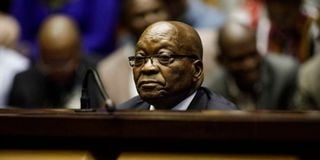Jacob Zuma loses last-ditch bid to slow corruption case

South Africa's embattled former president Jacob Zuma appears in the Pietermaritzburg High Court on corruption charges on October 15, 2019. On March 31, 2022, he lost his last bid to delay the case. PHOTO | MICHELE SPATARI | POOL | AFP
What you need to know:
- The Supreme Court of Appeal (SCA) on Thursday rejected Zuma's bid to have the state prosecutor in his long-delayed trial removed, and did so with costs.
- Zuma had argued that the prosecutor had lost 'title' to act in his matter due to alleged bias.
- But the SCA, as with the High Court before it, found there to be no merit in the argument, and said that there was "no prospect for success" should Zuma attempt a further appeal.
Former South African President Jacob Zuma has failed in his latest, and almost certainly last, effort to delay his court case in which he faces 783 counts of fraud, money-laundering and corruption charges.
The Supreme Court of Appeal (SCA) on Thursday rejected Zuma's bid to have the state prosecutor in his long-delayed trial removed, and did so with costs.
Zuma had argued that the prosecutor had lost 'title' to act in his matter due to alleged bias.
But the SCA, as with the High Court before it, found there to be no merit in the argument, and said that there was "no prospect for success" should Zuma attempt a further appeal.
Any appeal against the SCA would go to the Constitutional Court, which has already ruled harshly against Zuma's so-called 'Stalingrad strategy' of using any and all legal means to delay court processes, and is the same apex court that sent him to jail last July for contempt of its orders.
The Thursday ruling means that Zuma is certain to face his trial's commencement with the opening of the state's case set for April 11.
Zuma's case arises from a controversial arms deal from the 1990s, during which it is alleged he agreed to and received kick-backs from a French arms manufacturer Thint (then Thales).
Charges reinstated
The case was previously dropped by the state during his nine-year tenure as president, which ended in 2018, but that decision was found to be irrational by the courts and the charges re-instated.
Insisting that he is looking forward to his "day in court" so that he could "clear my name", Zuma has nevertheless used all known legal tactics – and tried some new ones – in his bid to delay his court case, or have it dropped again.
His apparently final ploy, once all other appeals and objections had been through the court process without success, was to make the claim that the prosecutor best suited to act for the state was technically to be barred from doing so.
It is that process which the SCA ruling has effectively brought to an end.
While, technically, Zuma could conceivably take the matter to the Constitutional Court, that body does not necessarily have to take the case— and given its history with Zuma, is considered by legal experts highly unlikely to want to have anything to do with it, in that the SCA has said Zuma has no reasonable prospects of success.
Zuma made four applications to the SCA, including against other determinations of the judge in his matter, all being rejected.
The SCA found that Zuma's petitions had "no reasonable prospects of success in an appeal and there is no other compelling reason why an appeal should be heard".
'Special Plea'
The besieged former leader had asked the appeal court for the right to challenge Judge Piet Koen's dismissal of his "special plea" application in which he sought the removal of prosecutor Billy Downer because of alleged bias and misconduct.
His case also included a plea that witnesses should be called to testify about the abuses he claims to have suffered at the hands of the state.
Zuma applied to lead further evidence in his appeal regarding his complaints that Downer had "leaked" publicly available court documents to the media.
Koen had found that none of this evidence related to whether Downer had the 'title' or legal right to prosecute in Zuma's matter, which was the central issue of the failed appeal to the SCA.
The state elected not to file any papers detailing its opposition to Zuma's attempts to appeal Koen's rulings against him.
The National Prosecuting Authority said the state welcomed the SCA's ruling, which comes as it prepares to resist Zuma's application for a further postponement of the case.
The NPA said the SCA had ruled on all outstanding issues and that Zuma's trial will get underway on April 11, with Thint as his co-accused.
Zuma's former 'financial adviser' was found guilty on the same charges facing Zuma, and sentenced to a 15-year jail term in 2006, but was released early, ostensibly on medical grounds.
With his trial-proper getting underway in the next short while, Zuma also faces other legal problems.
Besides the further costs involved in the SCA judgment – which costs Zuma has said he cannot afford – charges of corruption, theft, fraud and mismanagement of state funds have been laid this week against him and 18 others named in the state capture commission of inquiry under now Chief Justice Raymond Zondo.
Systemic Theft
The former African National Congress (ANC) leader was named along with numerous other former luminaries in both the ruling party and in government as playing key roles in the systemic theft of state monies during the Zuma presidency.
Trade union Solidarity chief executive Dr Dirk Hermann, whose organisation laid the charges, said they were laid in terms of the recommendations of the state capture commission.
Solidarity said the charges focused on the institutions and people that caused major damage to workers and to its members, and, apart from Zuma, included the former heads of several state-owned enterprises.




